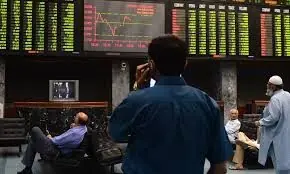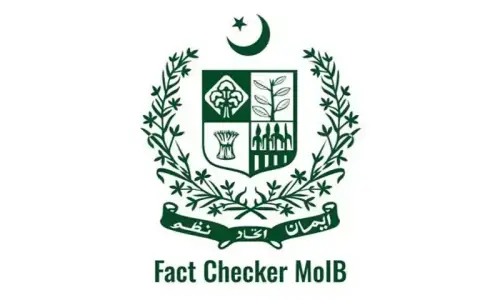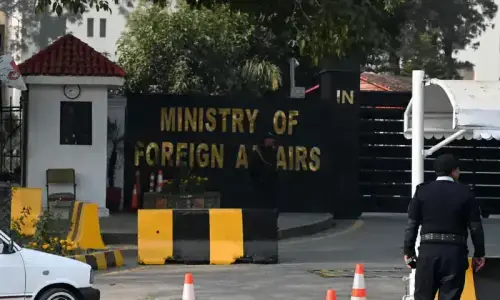Operating like a hands-on chief executive officer, Shahid Khaqan Abbasi is leaving a mark on government functioning within the short span of a couple of weeks, sometimes with mixed signals towards long-term economic governance.
He was quick to reconstitute all economic decision-making committees of the cabinet and become their head himself, directly getting control of important sectors and reconsolidating the centralised position of the prime minister’s office on economic issues, once enjoyed, a decade ago, by former prime minister Shaukat Aziz.
This was a departure from recent examples when former rulers of PPP and PML-N had devolved economic decision-making to finance ministers who virtually acted and behaved like deputy prime ministers.
Mr Abbasi highlighted challenges of a narrow tax base in his maiden speech and saw to it that the first meeting of the federal cabinet took a serious briefing from the Federal Board of Revenue even in the absence of the minister for finance and revenue, Ishaq Dar, who had air-dashed to the UAE on an unannounced visit.
Those who attend meetings on economic matters under PM Abbasi appear more impressed with his interest in the minute details of the challenges and solutions in socio-economic areas like health, energy and finance, unlike Nawaz Sharif who had sublet these areas to Mr Dar.
But if Mr Sharif kept with himself the portfolios of his interest — the Ministry of Foreign Affairs and Communications — Prime Minister Abbasi has centralised the ministries of power, planning and petroleum under his direct control. This has drastically reduced the powers of Finance Minister Dar who is now just another minister in a bloated cabinet.
Those who attend meetings on economic matters under the new premier appear more impressed with his interest in the minute details of the challenges and solutions in socio-economic areas like health, energy and finance
Mr Abbasi has kept mostly unchanged the team of bureaucrats and technocrats at Prime Minister Office, perhaps to maintain a working bridge with the centre of political power and the ousted prime minister Sharif, but some of them may already be showing independent muscle, albeit discreetly.
This is evident from two related but separate decisions in recent days. Nawaz Sharif had declined appointing a retired bureaucrat Jawaid Jehangir as Auditor General of Pakistan in April when the post fell vacant and resisted afterwards.
The officer grabbed the constitutional position four months later under Mr Abbasi as the prime minister and would lead the agency examining and certifying accounts of the PML-N government for four years.
Merit, transparency and governance in the FBR are another determinant of overall economic governance in the country.
Three postings in the revenue administration last week raised many eyebrows as the FBR gave three of the top grade-20 positions to grade-19 officers denied promotion by the Central Selection Board (CSB) as well as by the former prime minister since 2014.
These three grade-19 officers of the Customs Group have been posted against grade 20 slots as collectors of few most important collectorates at Peshawar, Lahore and Sialkot.
On the Supreme Court’s direction given in March this year, the CSB reconsidered in June the promotion cases of officers of all Groups and Services who had been denied promotions in 2015.
The CSB reconsidered the promotion cases on the basis of criteria not fundamentally different from those used in 2015. The results of reconsideration are not therefore likely to be any different.
Although results have been kept confidential, one thing that is known for certain is that they are yet to be seen and approved or disapproved by the prime minister.
If the CSB or the prime minister change their six-month earlier decision of denying promotions to these officers, many would wonder how an officer declared corrupt and denied promotion consistently for three years transformed into an honest and upright individual just in six months.
If those officers were not corrupt to begin with and yet denied promotion, the question should be why they were persistently tortured for three years.
The aggrieved may love to take such contradictory positions before the courts to prove that something other than corruption charges had been working in the background to entitle some officers for promotion.
They may be encouraged to ask for the constitution of a JIT to uncover the actual factors driving for so long the promotion drama.
An unfavourable decision, although consistent with earlier ones and safer for the decision makers, will lose meaning at least to the extent of officers who have managed to occupy BS-20 positions without their promotion in BS-20.
This underlines a fundamental flaw in the governance structure that tends to promote corruption instead of prevention.
The subjective and arbitrary decision-making helps the corrupt and well connected bureaucrats to beat the promotion policy of the government as evident from the fact some senior bureaucrats reported corrupt by intelligence agencies and denied promotion were later reported honest by the same intelligence agencies and promoted by the CSB.
This means such officers were caught unaware first time when the agencies and parent organisations filed reports but then came into action, putting their resources and influence at work to undo initial dossiers, resulting in many visibly corrupt officers managing to climb the promotion ladder and reach the highest grades.
When those responsible for the county’s economic governance appear to be grappling with government’s arbitrariness and selective promotions on questionable standards and spend most of time discussing their fate instead of public affairs, it is not hard to predict their quality of governing public affairs.
Prime Minister Abbasi would need to keep his mind and eyes open to curb such tendencies. He has the benefit of carrying limited political baggage, unlike his predecessor, to leave a lasting impression on governance.
Published in Dawn, The Business and Finance Weekly, August 21st, 2017

































